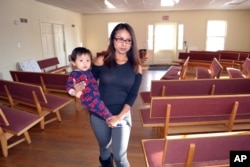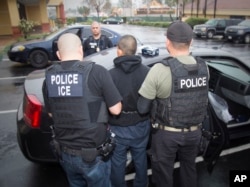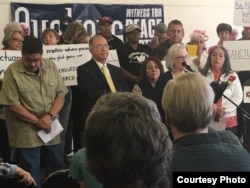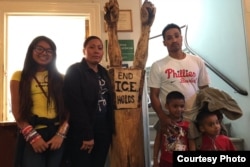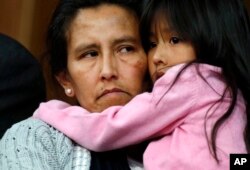Churches across the United States have formed a grassroots movement to oppose the Trump administration’s immigration policies and to offer sanctuary to undocumented immigrants threatened with immediate deportation.
More than 800 churches and some synagogues have declared themselves sanctuaries and are taking other measures to stop the deportation of immigrants who are in the country illegally.
All Souls Church Unitarian, located in the heart of Washington D.C.’s immigrant community, declared itself a sanctuary after President Donald Trump's election in November. As a candidate, Trump vowed to crack down on illegal immigration by building a wall along the U.S.-Mexican border and stepping up deportations of those already here, focusing particularly on those with criminal records.
Since he took office, he has issued three executive orders on immigration, including one that opens the door to deporting almost anyone without documentation.
All Souls Senior Minister Reverend Robert Hardies says his congregation is motivated to protect undocumented immigrants in the community.
“These immigrants in our neighborhood, they’re our neighbors. They’re our family members. They’re our co-workers. They’re our friends," he said. “So we want to stand in solidarity with the people that we’re close to.”
All Souls and other American churches provided sanctuary during the 1980s for Central American refugees fleeing the wars and massacres in the region. Earlier, during the Vietnam War, American churches offered sanctuary to those who refused to serve in the military.
Bishop Dwayne Royster, political director of PICO, a national network of faith-based community organizations, notes the idea of sanctuary goes even further back in American history.
“[It] goes back to William Penn and others who came from Great Britain escaping religious persecution, coming to Philadelphia and founding a community of religious liberty,” Royster said. “Sanctuary is very present in the underground railroad that existed in this country where there were faith communities that housed slaves that were escaping from the south. We find sanctuary to be a very important part of our identity.”
Honoring 'sensitive locations'
The exact number of undocumented immigrants now in sanctuary is unknown, in large part because those involved want to keep the cases private. However, there has been publicity surrounding a few cases of unauthorized immigrants taking refuge in churches, including in Denver and Philadelphia.
VOA recently reported on two undocumented immigrants, currently living in a Phoenix, Arizona, church. A Honduran woman under threat of deportation this month sought refuge at a Quaker Meeting House in Albuquerque, New Mexico. The 59-year-old woman, who goes by the name of Emma, arrived in the 1990s and has a traffic citation but no criminal record, according to her attorney.
For now, U.S. Immigration and Customs Enforcement (ICE) is following its practice of not entering churches to arrest those living there.
In a statement, ICE spokeswoman Jennifer Elzea said: “Enforcement actions at sensitive locations should generally be avoided and require either prior approval from an appropriate supervisory official or exigent circumstances necessitating immediate action.”
The policy was confirmed by Homeland Security Secretary John Kelly last week in a closed door meeting with congressional Democrats, according to the Washington Post.
“Sensitive locations” include schools, hospitals, churches, synagogues or mosques, according to ICE guidelines spelled out in a 2011 memorandum.
In the 1980s, some pastors and activists providing sanctuary were prosecuted and convicted of conspiracy for smuggling illegal immigrants. All Souls' Hardies says he is consulting with lawyers but is not overly concerned.
"I think churches as institutions have a certain kind of power and establishment in the community," he said, "... so I think that religious institutions in America can stand up to the power of the government.”
Aside from offering shelter to the undocumented, All Souls is mobilizing volunteers and training them to take action to prevent people in immigrant communities from being deported.
Rapid Response teams have been formed to alert communities when ICE agents are in the area or to accompany those picked up to immigration courts. Other groups canvass immigrant neighborhoods letting people know they have certain rights even if they are in the country illegally, including the right to stay silent and to demand a lawyer.
Keeping families together
While the number of congregations offering sanctuary more than doubled since the November election, the more than 800 places of worship offering refuge are just a fraction of the 350,000 religious congregations estimated to exist in the U.S. by the Hartford Institute for Religion Research.
At pro-Trump rallies earlier this month, demonstrators expressed support for stepped up enforcement measures to deport illegal immigrants, no matter what the costs. “It’ll be disruptive for some people who are here illegally,” said Trump supporter John Beckendorf who was attending a rally in Palm Springs, California. “I would like to think that families won’t be split but there may be some of that that happens.”
Preserving families is one of the main factors driving the sanctuary church movement, according to PICO’s Bishop Royster. “What you’re really talking about is the destruction of society, the very fabric of which is the family,” he said. “When you’re tearing undocumented parents from children who were born here in the U.S., we’re tearing families apart and we don’t want to see that happen. We believe our faith calls us to be better than that.”






